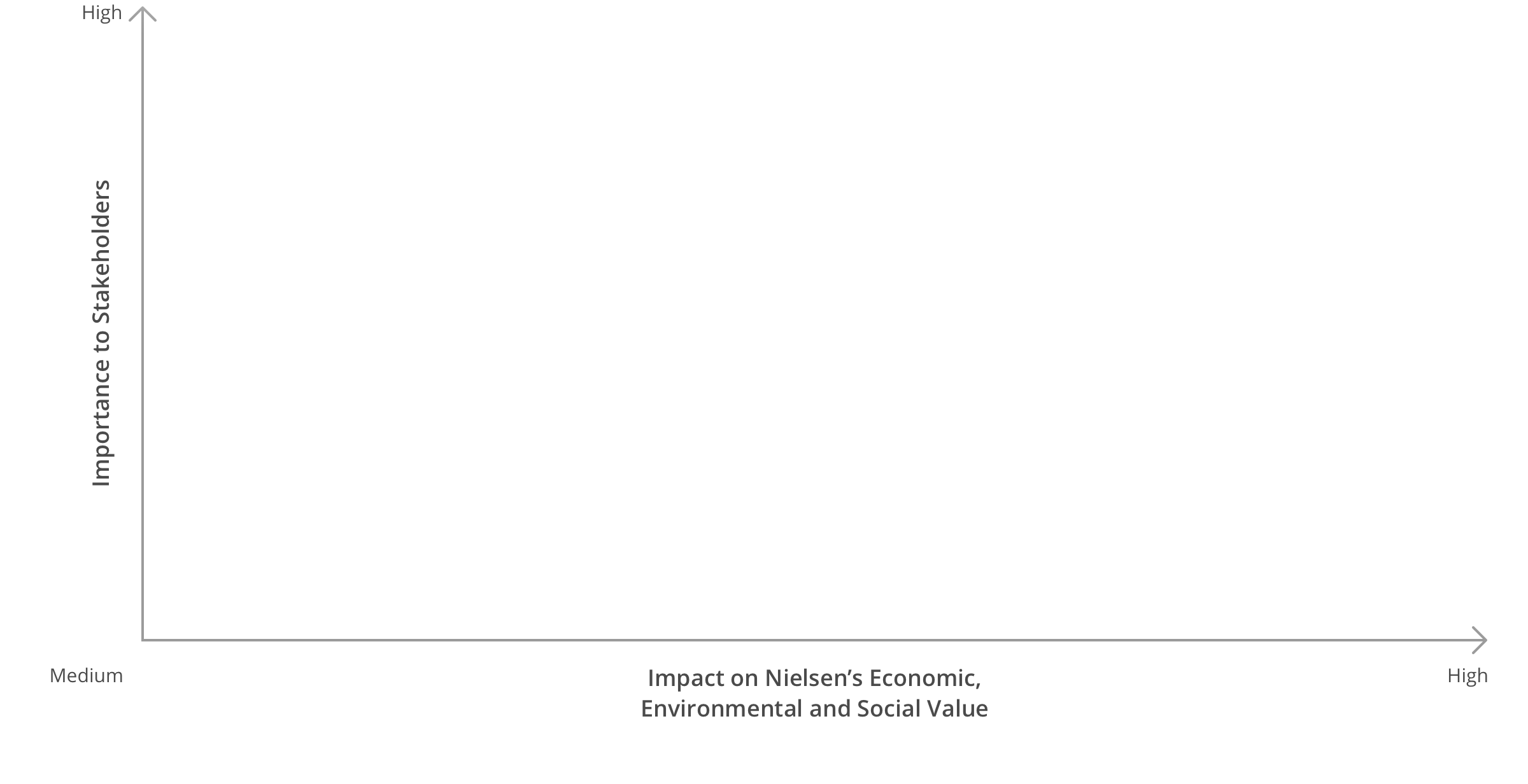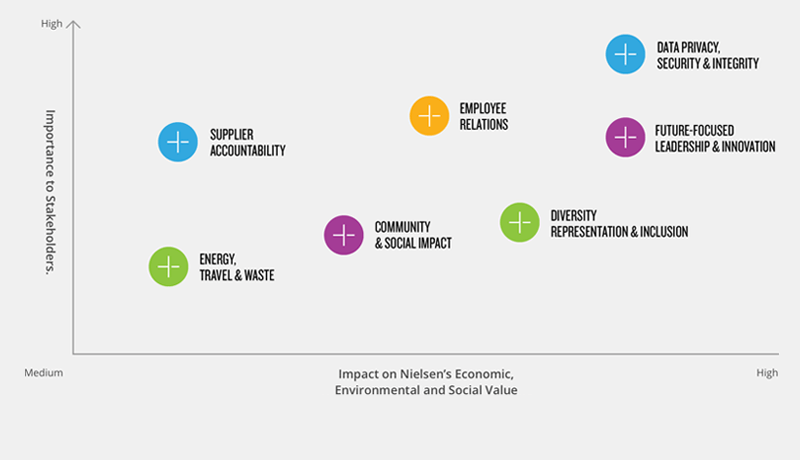
Global Responsibility & Sustainability
Through responsible, sustainable business practices and our commitment to giving back, we care for the communities and markets where we live and operate our business. Our Global Responsibility & Sustainability strategy at Nielsen includes all environmental, social, and governance (ESG) issues that affect our business, operations, and all internal and external stakeholders.
Non-Financial Materiality Assessment
In 2016 and 2017, we updated our non-financial materiality assessment, using the original findings from our first assessment conducted in 2014 and 2015 as a starting point. As it was before, our intentions in opening up the non-financial materiality process to all stakeholders is to incorporate this feedback into our overall processes, business strategy, and corporate responsibility and sustainability programs. Beyond seeking to better understand how stakeholders view Nielsen today, we also used the feedback to identify potential risks and opportunities both generally and in terms of our ESG goals, and any emerging issues that could affect Nielsen’s business success and stakeholder relationships in the future. Good governance, trust, and a commitment to transparency came up as dominant themes throughout this process. Our willingness to seek inputs from all stakeholders is aligned with Nielsen’s overarching values of being open, connected, useful, and personal. This updated assessment follows the guidance provided by the Global Reporting Initiative’s new Standards, formally introduced in 2016. Click on each area below to learn more about the feedback we received from stakeholders, as well as our approach to each area, including our long-term goals.
Top Issues Identified by the Non-Financial Materiality Assessment
Accountability

Travel & Waste

& Social Impact

Relations

Representation & Inclusion

Security & Integrity

Leadership & Innovation



- Supplier Accountability
-
Our approach: In line with our own expectations, our stakeholders expect Nielsen to manage and monitor the performance of our suppliers. We are committed to holding our suppliers to high standards in relevant environmental, social, and governance (ESG) areas, including human rights, integrity, diversity, ethics, and responsible business practices.
We have strengthened our overall approach to supply chain sustainability with a formal program, Nielsen Source Green, which was launched in 2016 to incorporate environmental, social, and governance performance in the management of our supply chain. The first year of the program completed in 2016 and focused on putting in place foundational elements aligned with best practices in sustainable sourcing including: establishing a system to measure and manage our suppliers’ ESG performance; embedding sustainability management in sourcing business processes; and connecting Nielsen’s program to leading industry-shaping collaborations. In 2017 and 2018, Nielsen plans to strengthen our ESG supply chain management even further at both the supplier level and product/service category level with specific, measurable key performance indicators and a track record of positive improvement over time. We recognize that sustainable supply chain management is one of the key ways that our company is delivering a societal impact that extends beyond a benefit to Nielsen. Nielsen’s purchasing power can be a powerful market force that contributes to addressing business challenges as well as social and environmental challenges.
Goals: Our current goals in this area are to include up to 100 of our top suppliers — or 50% of total sourceable spend with suppliers — in our supply chain sustainability program by 2018, up from more than a third of our spend in 2016. Our updated Supplier Code of Conduct will be launched in the first half of 2017 to all suppliers, and training will be provided to 100% of the Nielsen Strategic Partnerships and Sourcing Team as well as to 75% of our top strategic suppliers. We also plan to measurably raise awareness about our supply chain sustainability program internally through various communications channels throughout 2017 and beyond. Finally, we plan to establish an Environmentally Preferable Purchasing (EPP) policy and determine metrics to measurably increase our positive ESG impacts in each of the following areas of our spend: travel accommodations, air and ground transport, computers and office equipment, paper and printing, cleaning/janitorial services, event planning, and business process outsourcing (BPO) work. More information about our approach to Supplier Accountability can be found in the
Supply Chain
section of our Nielsen Global Responsibility Report.
- Energy, Travel & Waste
-
Our approach: In speaking with our stakeholders, we have identified energy, business travel and waste (particularly electronic waste, or e-waste, and paper waste) as the three largest environmental issues for Nielsen. These three distinct issues generally reflect the material environmental issues of other Professional Services firms. We recognize that Nielsen has an opportunity to expand on our commitment to reduce and maximize these and other aspects of our overall environmental footprint. Analysis continues to fully quantify and report the significance of each of these issues for Nielsen.
Nielsen’s energy use is both direct (consumed at our company-owned or rented offices and data centers) and indirect (shared and/or contracted data center use). Water use is not significant at this point in terms of Nielsen’s direct operations; however, it is recognized as an important societal issue. External stakeholders asked for more information about our greenhouse gas emissions (especially Scope 3), as well as energy use and reduction efforts related to our data centers. They have also requested that we set environmental goals and targets with an expanded data set to reflect our complete global footprint. By broadening our data collection efforts and working to improve our own environmental performance, we hope to deliver broader benefits to the planet and society as a whole, doing Nielsen’s part to address issues related to climate change. In terms of our Scope 3 emissions reduction efforts specifically, all Nielsen associates are encouraged to exhaust all travel alternatives such as video conferencing, virtual meetings, and conference calls before requesting permission to travel. Travel alternatives are systematically highlighted in our online booking tool with automated pop-up messaging and links to video conferencing details. Nielsen also prioritizes conducting business with socially responsible travel suppliers; we do this by tracking, monitoring, and engaging our travel suppliers on their environmental, social, and governance (ESG) performance through a third-party online platform.
Goals: By 2020, our goal is to reduce our global energy use per square foot of facility space by 5%. We are using 2015 North American data as a baseline for this as we expand our data collection efforts globally; in 2016, we expanded our data collection efforts to include both North American and Latin American data. Additionally, in 2018, Nielsen plans to join the Carbon Disclosure Project (CDP) Supply Chain Program to manage the risks and opportunities associated with climate change in a standardized way across our supply chain. This participation will help Nielsen improve its supply chain transparency and environmental performance and facilitate our suppliers gaining opportunities from increased energy efficiency, leading to decreased costs and better preparedness for climate-related risks. More information about our approach to Environmental Sustainability efforts, including as it relates to Energy, Travel & Waste, can be found in the
Our Environment
section of our Nielsen Global Responsibility Report.
- Community & Social Impact
-
Our approach: Stakeholders expressed appreciation for Nielsen’s existing community efforts, alliances, and partnerships through initiatives like Nielsen Cares, our global employee volunteer program, and Data for Good, through which we support initiatives such as Project 8, the data platform for forecasting developing human needs.
Nielsen’s community impact encompasses our role as a good corporate citizen and employer, our engagement in skills-based volunteerism, and our participation in in-kind giving with nonprofits. We also deploy our research expertise to provide insights to community leaders. We are aware that the data we collect from individuals in the community must be protected and used carefully no matter what the circumstances; we understand our responsibility relates to ensuring the representation of all communities.
Goals: Our goals in this area are focused on the long term; from 2016 through 2020, our goal is to provide $50 million in value through pro bono projects and skills-based volunteering, including the donation of Nielsen data, and mobilizing our associates to volunteer a cumulative total of at least 300,000 hours in the communities where we live and work around the world. We have created a new Nielsen Foundation to encourage associate volunteering and giving, stakeholder support, and Data for Good and nonprofit grants. More information about our approach to Community & Social Impact can be found in the
Our Communities
section of our Nielsen Global Responsibility Report.
- Employee Relations
-
Our approach: Through interviews and focus groups, we have identified opportunities for greater strategic engagement with employees regarding decisions that affect them, including but not limited to: maintaining a flexible work environment, performance rewards and compensation, workspace and equipment enhancements, integrating new employees into Nielsen through acquisitions, and further growing our broad range of career advancement opportunities. A rising issue for employees in the Professional Services industry in general is a need for more training to upgrade skills in the areas of digital and mobile measurement and innovation. External stakeholders expressed a desire for more information about our ongoing employee retention and turnover mitigation efforts as well as greater transparency around more specific human capital goals.
We have an inherent responsibility to provide a safe, healthy and fair work environment for all of our employees. Beyond this, we also endeavour to provide unique career and education opportunities, compensate fairly based on a culture of meritocracy, demonstrate support for diversity and inclusion, and encourage employee satisfaction. We recognize that in order to continue to grow our business around the world, we need to continue to find innovative ways to hire and train employees with the right skills and expertise.
Goal: Recognizing the importance of diversity and inclusion for our global workforce, we offer specific training on diversity and inclusion for managers and associates. Partnering with a diverse supplier, we’ve had 93% of our global managers complete the core program since 2014, focused on expanding the conversation around diversity and inclusion. The program is designed to help managers better understand the importance of diversity and inclusion as a business imperative and learn key messaging and skills for fostering an inclusive work environment. Phase two of this series focuses on Unconscious Bias training. Our aim is to have at least 80% of all global associates complete at least one of the diversity and inclusion trainings by 2019, while continuing to offer additional resources that support the learning after the formal training is completed. More information about our approach to Employee Relations can be found in the
Our People
section of our Nielsen Global Responsibility Report.
- Diversity Representation & Inclusion
-
Our approach: It is crucial that our organization is inclusive and reflects the diversity of the markets we measure. To accomplish this, we partner with a broad range of stakeholders, including our clients, suppliers, employees and senior leadership, as well as current and potential research sample panelists. We also ensure that our methodology, data, and insights are inclusive and representative of the diverse communities and demographics that we measure.
An example of this commitment can be found in our Diverse Intelligence Series reports, a collection of comprehensive insights regarding U.S. diverse consumers and their unique consumption and purchasing habits. Reports have been produced regarding African-American, Hispanic/Latino, Asian, and LGBTQ consumers, and for the first time in 2016, consumers with disabilities.
Internally, we realize Diversity & Inclusion is crucial to Nielsen’s growth, strength and ability to innovate. The mission of our Diversity & Inclusion strategy, therefore, is to infuse Diversity & Inclusion into the DNA of the company with a focus on accountability, career development, retention, supplier diversity and education/engagement. We also state very simply that we oppose discrimination on grounds including religion, race, ethnicity, gender, gender identity or expression, age, national origin, disability, and sexual orientation. We define diversity as far more than what you see — it is the collection of different skills, experiences, talents, and cultural backgrounds. And inclusion is defined as the ability to value and leverage these differences to achieve superior results.
Goal: At Nielsen, we have established a companywide minimum goal of 10% in annual spend with diverse suppliers globally. Each business unit has their own goals based on opportunities in their specific areas of spend. This goal is also shared with our suppliers through our supplier diversity Tier 2 program, where suppliers report their direct and indirect diversity spend to support our program. Supplier diversity performance against goals is shared in our Nielsen Diversity & Inclusion annual report and presented to our External Advisory Council twice a year. More information about our approach to Diversity Representation & Inclusion can be found in our Nielsen Global Responsibility Report and our Nielsen Diversity & Inclusion Report.
- Data Privacy, Security & Integrity
-
Our approach: We reinforce our commitment to ensuring our data is protected, especially in light of the globally-recognized risks to data security overall. In speaking with our stakeholders, we recognize a particular interest in the processes used to conduct market research through mobile and digital sources. Other rising areas of stakeholder interest center around validation and ethics issues related to new, broadly-used research techniques.
We recognize our critical responsibility to scrupulously manage the data we collect. This includes, but is not limited to, the protection of privacy for our clients, employees and the consumers we measure; securing our data so that it is accessible only to authorized personnel for authorized purposes; and ensuring that our data is of the highest quality practicable. This is fundamentally linked to Nielsen’s role as a trusted provider for our clients and to our position as an independent measurement provider for the industries we serve. Beyond this 90-plus year commitment, we follow closely consumer attitudinal, legal and regulatory changes around the collection, use, and access of data.
Goal: Throughout 2017 we continue to adjust our policies, organizational responsibilities, and operating procedures as needed to respond to new laws and regulations including the European Union’s General Data Protection Regulation (GDPR). More information about our approach to Data Privacy, Security & Integrity can be found in the
Our Clients
section of our Nielsen Global Responsibility Report. Nielsen’s current privacy practices are described in our updated public-facing privacy statement.
- Future-focused Leadership & Innovation
-
Our approach: We are committed to taking bold and swift new action in the face of change. Like our stakeholders, we recognize that innovation only counts as innovation if it’s delivered at the right time and in the right way; this is a critical component of what useful means to Nielsen within our overall values framework. Innovation is the foundation for our commitment to working with our clients to determine what’s next.
We continue to seek to introduce more innovative methodologies, products, and solutions that help our clients have a complete understanding of the evolving consumer landscape, measuring what consumers are watching and what they are buying. We will continue to introduce solutions that not only measure our clients’ performance, but also help clients improve their business results. We do this through open dialogue with our clients and through strategic elements of our business like additive mergers and acquisitions, our Nielsen Innovate Fund, and our Nielsen Innovation Lab. We aim to be the best in the world at execution by remaining focused on our key strategic priorities, with innovation at the core of everything we do. This future-focused approach includes the adoption of new technologies, shifts in our internal company culture to encourage employees to be more innovative, and to more actively seek out business partnerships and acquisitions that provide value-added, innovative solutions.
Goal: In order to encourage our culture of innovation, by 2020 we plan to grow our commitment to regular training for all associates by at least 80% of associates taking at least one training program annually. More information about our future-focused strategic direction can be found throughout our Nielsen Global Responsibility Report.
More information about our ongoing stakeholder engagement efforts and our global ESG approach can be found in our Nielsen
Global Responsibility Report, published in May 2016. At Nielsen, we broadly define corporate responsibility
and sustainability
across the relevant ESG aspects of the company, including but not limited to the impact of
our efforts related to Global Responsibility & Sustainability, Diversity & Inclusion, Human Capital Development,
Supply Chain Sustainability, and our overall business performance cutting across all teams, geographies, and functions.
2016 Highlights
Published first Nielsen Global Responsibility Report
Joined Sustainable Purchasing Leadership Council
Advanced to No. 41 on DiversityInc’s Top 50 Companies for Diversity
Included on Fortune’s list of 100 Best Workplaces for Millennials and 50 Best Workplaces for Diversity
Impact by the Numbers
23,000+ employees participated in Nielsen Global Impact Day with 1,400+ volunteer events for 900 nonprofits in 92 countries
26,000+ employees participated in Earth Week 2016 activities
Reached $11.8 million donated in-kind through data, products, and skills-based volunteering, surpassing global annual pledge of $10 million
Recycled 129,000+ pounds of company e-waste
RESPONSIBLE PRACTICES AND REPORTINGConnecting Our Business with Relevant Environmental, Social and Governance (ESG) Issues |
||
Nielsen CaresVolunteering Our Skills and Time |
||
Nielsen GreenManaging Our Impact on the Environment |
||
Data for GoodSharing Consumer Insights and Data with the World |
SNAPSHOTS OF OUR $10 MILLION+ PRO BONO GLOBAL IMPACT
California
Analyzed 1 million+ downloads of accessible books to help nonprofit better reach schools and users
Europe
Surveyed 2,000+ apprentices, employers, and education providers to measure success of youth apprenticeship programs across network of 200 companies
Philippines
Completed 69 hours of computer literacy training by 18 volunteers for a children’s nonprofit
Florida
Mobilized 70 volunteers to deliver 5,300 pounds of e-waste for recycling
South Africa
Packed and delivered 5,120 meals for Hunger Action Month
Singapore
Interviewed 179 nonprofit beneficiaries and analyzed survey results to enable nonprofit to better optimize their program offerings
Priority Areas
| Hunger & Nutrition | Technology | Education | Diversity & Inclusion | Sustainability |
Priority Areas
| Hunger & Nutrition | Technology | Education |
| Diversity & Inclusion | Sustainability |




